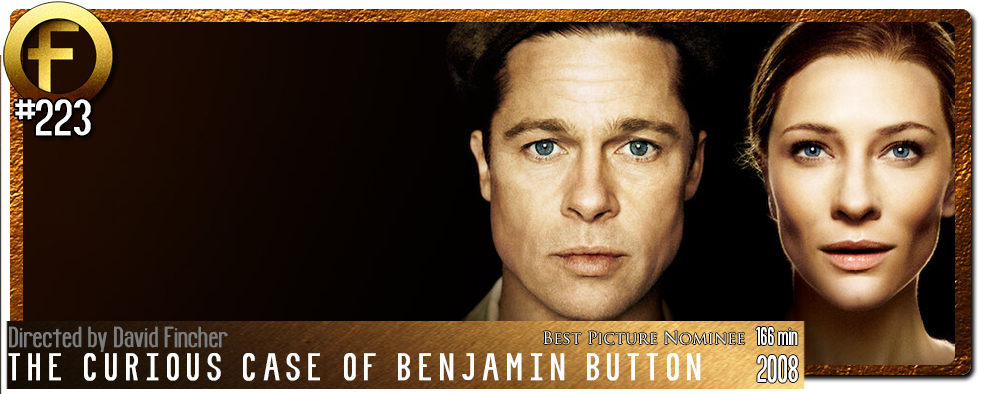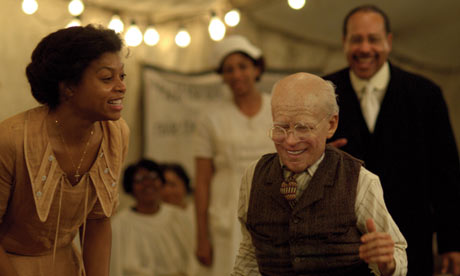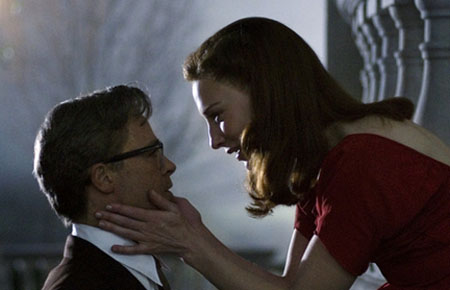Movie Review – Curious Case Of Benjamin Button, The
I found The Curious Case of Benjamin Button to be a wonderful, if somewhat melancholy, exploration of death, life and relationships, told with the skill of a master storyteller. With a generally uniformly cast, and some dazzling effects to complement the story, Benjamin Button is a magnificent film achievement.

Cast : Brad Pitt, Cate Blanchett, Taraji P Henson, Julia Ormond, Jason Flemyng, Tilda Swinton, Jared Harris, Elias Koteas, Ed Metzger, Mahershala Ali, Faune A Chambers, Phyllis Somerville, Edith Ivey, Josh Stewart, Robert Towers, Tom Everett, Spencer Daniels, Chandler Canterbury, Charles Henry Wyson, Elle Fanning, Madisen Beaty, Kutta Hules, Shiloh Jolie-Pitt.
Synopsis: A man born old, who grows younger with each passing day, meets a girl with whom he falls deeply in love.
***********
I have followed David Finchers directorial career for a while now, since his aborted attempt to coherently tell the story of Alien 3, when he famously stated he’d never work with Fox studios again. Since then, Fincher’s body of work has been steadily improving, and although perhaps not as commercially successful as most studio heads would like, his commitment to quality of storytelling has been second to none. From Fight Club and Se7en, as well as Panic Room and more recently Zodiac (and let’s not forget the sleeper thriller The Game, which I felt was criminally underrated) have, in my mind, catapulted Fincher from simple (yet stylish) MTV video clip director to master showman. Fincher’s cinematic ability is first rate, and after viewing this Oscar contender, I bet the guy who dumped him from Alien 3 duties is now kicking himself.
I liken Fincher to the style and passion of Robert Zemeckis, in the way in which he really uses the film medium to tell his story. Every shot of Finchers is like a painting, especially here in Benjamin Button, a film based on the F Scott Fitzgerald short story of the same name. Fincher’s deft use of cinematography, in which he flavours the period parts of the film to look like vintage material, is of the highest order, the use of lighting and shadow to really bring the characters, the tone of the film, to vivid life.
The most important part of the film is, of course, the story. Some have labelled the film’s story of a mans life set against the events of the world as very much in the vein of Forrest Gump (directed by the aforementioned Zemeckis!), and to a certain degree, they’d be right. The tone of the film is one of reflection and loss, as Benjamin goes through life gradually losing everyone that is important to him, while gradually becoming more and more vital. Born with some sort of condition that ages him in reverse, he encounters some unique problems in his life; perhaps the most important and impossible to comprehend is that were he to have children, he would never live to see them grow up, and eventually he would appear to be younger than them. Mind-bending philosophical and ethical issues aside, Benjamin Button is a beautifully written film, filled with great characters (and some, admittedly, not so great). The whole film is a little like a great feast: you eat your fill and no more, rather than scoffing mouthful after mouthful.

We begin with an elderly Cate Blanchett in hospital, close to death, as the onset of Hurricane Katrina begins to kick into action. Blanchett, playing the role of Daisy, Benjamin’s love interest, asks her daughter Caroline (Julia Ormond) to read from a mysterious diary, which turns out to be the memoirs of one Benjamin Button, who was born the day the Great War ended. Benjamins father, played by a strangely uncomfortable-looking Jason Flemyng, takes his newborn to a nursing home after his wife dies and the baby is revealed to be horribly deformed. Queenie, who works in the nursing home, decides to keep Benjamin until he dies, since the doctor who examines him proclaims the baby to be that of an old man, beset by arthritis and other elderly diseases, including cataracts. The problem is, Benjamin begins to become younger, turning from a shrunken old man into a robust, youthful 30-something, and then into a teenager. Of course, this de-aging is progressively shown throughout the length of the film, interspersed with moments between the dying Daisy and Catherine. As Benjamin becomes younger (while actually getting older) he encounters a young Daisy, whom he befriends, and they strike up an unusual relationship, in that Daisy seems to understand that Benjamin is simply a child inside and old mans body. It takes a brave film-maker to allow this little tidbit of information to sink in to the viewers conscience, however, Fincher does so with unusually sublime ease.
During the course of his life, Benjamin visits a brothel looking about 60-ish, although his actual age is closer to 19, gets a job on a tugboat and is seconded to the US forces in WWII as a debris recovery ship, travels the world and even has an affair in Russia with a woman who claims to have almost swum the English channel (Tilda Swinton). It’s a kind of Forrest Gump styled adventure, with Benjamin encountering a number of disparate, strange and unusual people, with whom he has experiences of vary natures. All the while, the only person with who Benjamin has a long term connection with is Daisy. Daisy, meanwhile, has followed her dream to become a dancer, dancing with a company in New York, until an accident forces her retirement early. She has always held a candle for Benjamin (at one time, trying to seduce him and failing, only for Benjamin to come running back to her a little too late) and when they both reach the same approximate age, they finally get together.

The emotional obstacles only become harder when Daisy and Benjamin begin to become further apart in age, as Daisy approaches her fifties and beyond, Benjamin regresses into a puberty-ridden teenager (developing dementia along the way, since he’s now around 80-ish). Daisy is forced to not only raise their daughter without Benjamin (since he is slowly losing the ability to) but she also must look after a deteriorating Benjamin himself, in one of cinema’s weirdest love stories.
The story and themes are handled well, with Fincher neither blanching from the problems Benjamin faces, nor skirting the issues of the time-frame the film is set in. The film’s somewhat uneven tone is tempered by a sheer love of the source material, and although leisurely paced, never loses steam due to the magnificent performances from the lead cast. Pitt, as Benjamin, is great, although his accent throughout seems a little off-kilter for him. I don’t think Pitt is a great one for accents, and I think this is a major caveat for the film, although still small in comparison with the positives. Blanchett is gorgeous, giving Daisy a tortured, soul-crushing portrayal of a woman who is desperately in love with a man who she cannot possibly share her life with in it’s entirety. Both these two actors are hardly stretched during this film, however their class as performers means they rise above even the most inane material: in Benjamin Button, they radiate charm and elegance.
It would be remiss of me to mention this film and not talk for a moment about the dazzling effects, particularly the Oscar winning age-makeup and effects. Finchers use of a combination of CGI and practical effects to create the ancient Benjamin, the twenty-ish Benjamin, and the youthful-to-deathbed Daisy, is extraordinary. In years to come, once the hubbub of the effects on this film has died down, people will still be marvelling at the work done on Brad Pitt in this movie. Fincher and his team have managed to produce an amazingly young looking Pitt, reminiscent of his looks in Thelma & Louise. It’s an astounding piece of cinema, and nowhere near as fake-looking as the “young” Patrick Stewart moments in X-Men 3. The combination of practical and digital is to be applauded, in this day and age where it seem everything must be borne of a computer.

Overall, I found The Curious Case of Benjamin Button to be a wonderful, if somewhat melancholy, exploration of death, life and relationships, told with the skill of a master storyteller. With a generally uniformly cast, and some dazzling effects to complement the story, Benjamin Button is a magnificent film achievement.

Great review, you really know what your talking about which is why I was hoping you might be able to take a look at a similar story for my A level coursework, it’s not too long. I just need you to tell me what you think and what you think was good about it, if any and what wasn’t.
And thank you for commenting, Mark. nice work!
I thought one of the best parts was towards the end when Fincher includes a montage of the "old" Ben doing the menial jobs of young men (cleaner, car park attendant) as he travels the world and moves towards his dotage.
I agree with the review – this was a great, truly heart wrenching film.